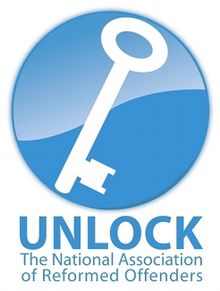- UNLOCK, The National Association of Reformed Offenders
-
"Unlock" and "UNLOCK" redirect here. For other uses, see Unlock (disambiguation).
UNLOCK, The National Association of Reformed Offenders (formerly known as UNLOCK, The National Association of Ex-Offenders) is an independent United Kingdom-based charity, established in 2000 to campaign for the equality of reformed offenders.
UNLOCK describes its vision of equality for reformed offenders as “A society in which reformed offenders are able to fulfil their positive potential through the enjoyment of equal opportunities, rights and responsibilities.”
Contents
Charitable objectives
- Achieve equality for reformed offenders (including anti-discrimination legislation and voting rights for prisoners)
- Decrease financial exclusion amongst reformed offenders (including education, bank accounts, insurance)
- Decrease social exclusion amongst reformed offenders
- Provide information, advice and support to reformed offenders
- Be a respected voice for reformed offenders in the United Kingdom
Membership
UNLOCK has over 4000 members and handles several thousand enquiries per year. The charity works with serving and former offenders who demonstrate a genuine commitment to lead a crime-free lifestyle, helping them become productive members of their local communities.
History
The association was originally established in 1998 by a group of reformed offenders who had successfully rebuilt their lives after serving prison sentences. They wanted to use their experience of the great difficulties faced by those coming out of prison to assist others who genuinely wanted to "go straight". This group included Stephen Fry, Bob Turney and founding Chief Executive Mark Leech, who left the organization in May 2002 to pursue commercial interests. Unlock's first president was Sir Stephen Tumim a former judge and Her Majesty's Chief Inspector of Prisons. UNLOCK gained charitable status in the year 2000. In 2007 it rebranded as UNLOCK, The National Association of Reformed Offenders in order to emphasize the journey which its members had been on.
Mark Leech, the group's founder, supported the continuing imprisonment of farmer Tony Martin in 2003.[1]
The group has campaigned to give imprisoned criminals the vote.[2]
Leadership
The current President is General The Lord David Ramsbotham GCB CBE, formerly Her Majesty's Chief Inspector of Prisons and now a cross-bencher of the House of Lords.
The current Chief Executive is Bobby Cummines OBE FRSA, who served 13 years in prison for serious offences. He began working for UNLOCK in October 1998 as an unpaid volunteer, quickly becoming Deputy Chief Executive and then Chief Executive with the resignation of Mark Leech. Bobby Cummines is now one of the most widely recognised and passionate advocates of penal reform in the UK, advising government and the judiciary and regularly appearing in the national media. In 2004 he was appointed to the public inquiry in the murder of Zahid Mubarek at Feltham Young Offenders' Institution. He was also a member of the Home Affairs Select Committees for disabled prisoners and the review of the Rehabilitation of Offenders Act 1974.
Funding
The organisation is funded by voluntary donations from both individuals and charitable organisations. Major projects are funded by grants from charitable trusts such as the Esmee Fairbairn Charitable Trust, Big Lottery Fund and the HBOS Foundation. Membership in the charity is free.
References
External links
Categories:- Charities
Wikimedia Foundation. 2010.

